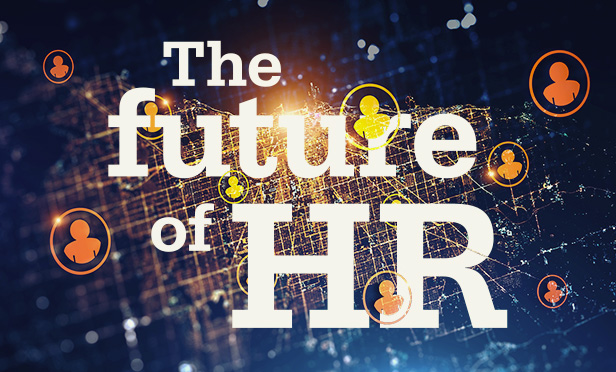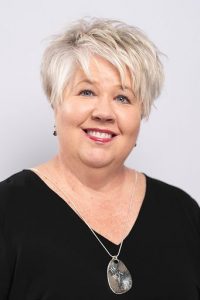 "The relationships between the CEO, CFO and the CHRO are critical and the changing workplace dynamics have highlighted the importance of these relationships," says Kelley Daviss. (Graphic by Chris Nicholls)
"The relationships between the CEO, CFO and the CHRO are critical and the changing workplace dynamics have highlighted the importance of these relationships," says Kelley Daviss. (Graphic by Chris Nicholls)
If the past two years have taught HR leaders anything, it's the critical need to "adapt and pivot."
 Kelley Daviss, executive vice president, human resources, Lendmark Financial Services
Kelley Daviss, executive vice president, human resources, Lendmark Financial Services So says Kelley Daviss, executive vice president, human resources at Lendmark Financial Services, a household credit provider based in Lawrenceville, Georgia. In our latest chat in this series, BenefitsPRO caught up with Daviss to discuss how human resources has changed dramatically and how HR leaders post-pandemic must continue to be flexible in how to best treat and engage employees for both their well-being and their organization's bottom line.
Recommended For You
Katie Kuehner-Hebert: How has the role of HR professionals changed in recent years, and what's driving it?
The environment has changed tremendously in the last few years. We're managing five generations in the workforce; technology has become more advanced resulting in the opportunity to provide more impactful analytics and providing the employee a more holistic experience has become more of a business imperative rather than a nice to do. HR's role remains dynamic with more complex employment laws and a hiring landscape that requires much creativity in hiring, retention and what total compensation looks like. Then layer on what HR has taken on these last two years managing a pandemic.
For Lendmark, a strong comprehensive plan during the pandemic was a necessity to keep our employees safe and healthy, keeping our customers comfortable and safe, and keeping our branches open so our customers still have access to loans that help them manage planned and unplanned life events.
KKH: How has this shift impacted the relationship between the C-Suite, HR and employee benefits consultants?
The relationships between the CEO, CFO and the CHRO are critical and the changing workplace dynamics have highlighted the importance of these relationships and how these partnerships have evolved over time. It's important these roles align in lockstep on the strategy of people.
And because the role of HR is different and what is expected from employees is more comprehensive, the benefit consultant must understand the business – our business and our strategy. Employing those subject matter experts with direct exposure to a wide array of best practices within other companies helps us to provide world-class benefits that support the whole employee including physical, emotional, social, and financial wellbeing.
KKH: How has technology changed the way you work? How has it changed your role in the company?
The role of technology and analytics has exploded in my position at Lendmark. Our business is thirsty for analytics to enable our teams to be most proactive. Our systems must inform us of trends and provide predictive analytics so our business decisions can be more focused than ever. The business expects this of HR.
KKH: Do you see an increasing need for specialization within the field (talent management, compliance, diversity & inclusion, etc.)?
For a medium-sized company we need specialists especially in HRIS, leave management, as examples, but, equally important, is assembling a team with several members possessing broad-based expertise – including those with business experience – makes us more agile. That's been our HR mantra these last two years – adapt and pivot. We must change on a dime to stay ahead of what we need to do to help drive company results. Having people on my team with the ability to flex has been an advantage.
KKH: What skills will be most important to HR professionals in the future?
First and foremost — and this has always been the case — HR professionals need to build meaningful relationships with all levels of employees. Everything stems from this foundation. HR pros must have the ability to combine data with the ability to think systemically to drive strategy decisions. Expertise in change management skills are increasingly important as priorities shift. They need to be comfortable reacting quickly to changing conditions and possess expertise in how to identify and develop leaders of the future.
KKH: What trends, challenges or issues do you see most affecting your profession?
Candidates and employees expect more from their employers. They want a complete employment experience that doesn't look like their father's experience. They demand flexibility, movement, variety and opportunities. They want to connect their work with a greater purpose, and they want to know their employer is contributing to some bigger objective.
Work looks different to people. We have to continually understand this dynamic and be able to predict their wants and needs. Employees are truly the key to that ideal customer experience. HR's ability to engage and really connect with employees so their experience is curated to be what means the most for them will make the real difference for our customers.
© Touchpoint Markets, All Rights Reserved. Request academic re-use from www.copyright.com. All other uses, submit a request to [email protected]. For more inforrmation visit Asset & Logo Licensing.







